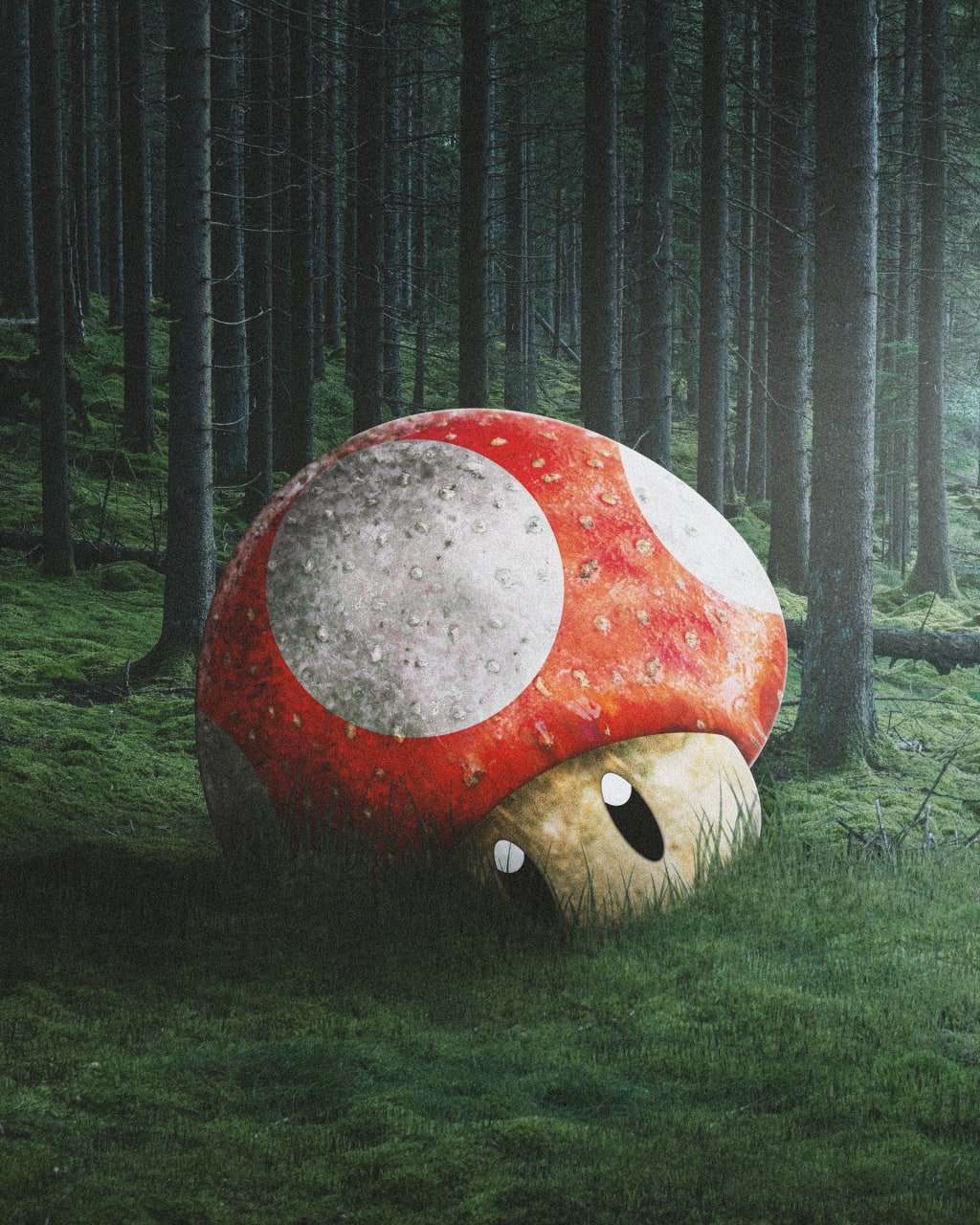From Super Mario to Super Therapist: The Increasing Research into Magic Mushrooms
Using Psychological Approaches to Explore a Contemporary Social Issue

Mario is an iconic game character created in 1981 that took the world by storm and is loved by everyone. This princess saving, Koopa slaying hero traversed varied lands and took down the mightiest enemies. However, he could not do this alone. Throughout his journey, Mario would consume mushrooms to rejuvenate himself and unlock enhanced capabilities.
Fast forward 41 years and the use of mushrooms is making a comeback in western culture with research into psilocybin (the active ingredient in magic mushrooms) highlighting the benefits it can have for people with depression as well as increasing the activity in your frontal cortex and further developing other connections in your brain. With reports from users of magic mushrooms explaining how they can see sounds or hear colours, how their view on life changed for the better with their loss of ego and how they have a profound sense of unity, it is easy to see why governments for the past two years have been deliberating decriminalising the drug with places such as Denver succeeding in 2019.
So why is psilocybin still a class A drug in the UK? Would the legalisation of magic mushrooms have a profound psychological effect on the nation, or would the long-term side effects of use simply replace one psychological deficit with another? The current known benefits of psilocybin may put magic mushrooms into the top range of smart drugs, but what if there had never been any monsters in Super Mario and he had simply consumed too much?
To start, we need to understand what psilocybin is and what it does to the mind. Indolealkylamine psilocybin is a psychoactive chemical found within over 200 species of mushrooms across the world with human use of this drug predating recorded history. Once ingested, your body converts it through a dephosphorylation reaction into psilocin which is a known antagonist of the serotonin 5-hydroxytryptamine (5-HT) receptors. In a medium dose (12 – 20 mg p.o), the drug is shown to produce an altered state of consciousness though stimulation of affect, enhanced ability for intro-spection and altered psychological functioning in the direction of Freudian primary processes (Passie, T., Seifert, J., Schneider, U., & Emrich, H. M., 2002).
Throughout all stages of human history, the use of magic mushrooms can be documented within a variety of spiritual activities designed to help people unlock what was (and in some cultures still is) regarded as a higher state of consciousness. McKenna (1993) released a theory explaining that it was due to the consumption of psilocybin in early Homo Sapiens that caused the development of enhanced cognitive abilities allowing Homo Sapiens to process information in a new way and develop in creativity. Although at the time, this theory was discredited, it has since been brought back to life as a possibility with mentions from popular psilocybin mycologist Paul Stamets who has received awards for his mycology work and is the main speaker in the Netflix documentary Fantastic Fungi.
In 1993, The Heffter Research Institute was founding with the sole purpose to explore the medicinal value of psychedelics with the institute’s focus being on psilocybin. Their first study was to analyse the possible effects of psilocybin on people with OCD. They have since sponsored additional studies on this such as the 9 patients with DSM-IV-defined OCD and all studies have shown a decrease in symptoms of obsessive-compulsive disorder (Moreno, F. A., Wiegand, C. B., Taitano, E. K., & Delgado, P. L., 2006).
Recently, there have been an increase in studies showing strong qualitative data to reinforce psilocybin’s positive effect on those with psychological disorders such as depression. A study done of 51 advance stage cancer patients who all developed symptoms of anxiety or depression due to their diagnosis had some remarkable results. Participants of the study initially showed a substantial increase in positivity towards quality of life, themselves, and optimism. What is also remarkable is that at the 6-month follow up, 80% still showed a significant clinical decrease in depression and anxiety (Griffiths, R. R., Johnson, M. W., Carducci, M. A., Umbricht, A., Richards, W. A., Richards, B. D., Cosimano, M. P., & Klinedinst, M. A., 2016).
With all the positive outcomes from these controlled experiments, it is easy to rally behind those looking to decriminalise the current class A drug. However, as with any type of substance, there is the ability to abuse its use which could have both physical and psychological impacts.
Psilocybin has shown it has significant positive impacts on the brain and the way people think, but it has also showed that some people can have adverse effects. There are widely documented cases of people consuming to much in one dose or doses with a brief period of time and experiencing what is referred to as a ‘bad trip.’ During this experience, positive thoughts can become extremely negative with people have reported feeling as though their life is worthless, becoming paranoid of those around them or creating a fearful experience whilst hallucinating.
With psilocybin showing to have such a powerful and long-term effect on the psychological aspects of the brain, it would be a fair assumption to assume that someone who experiences strong depressive or anxiety-based thoughts during a bad trip, could potentially have continuous negative thoughts for a prolonged period of time afterwards. There is quantitative data done by Johansen and Krebs (2015) which is a survey of 135,095 randomly selected American adults with 19,299 psychedelic users. The outcome of the study was to see if long term use of psychedelics has a negative impact on mental health. The result showed no association between lifetime use of psychedelics and decline in mental health. Unfortunately, there have been no controlled studies to solely analyse the long-term effects of a negative experience to further bolster the claims of Johansen and Krebs.
The final aspect that needs to be addressed is the ethical challenges if this drug where to be decriminalised for public use. For this, I think it is best to compare with a popular and controversial ‘smart drug’ called Modafinil. This particular drug was initially designed for people with Narcolepsy. This is a mental disorder that causes patients to suddenly fall asleep at either random or inappropriate times. This puts the patient in a mental deficit category. However, people who are regarded as having normal mental health found that is they also consumed Modafinil, it would provide certain benefits to their focus, ability to learn and recall memory with possibilities that continuous use could potentially push these people into an enhanced capability category.
People with severe depression, anxiety, or other psychological problems that psilocybin is found to assist with can also fall into the mental deficit category. By consuming psilocybin, they have an additional avenue to overcome this mental deficit and fall into the ‘normal’ category. With this in mind, we do not know what the enhanced capability potential is of those who are already classed as normal. If the drug is publicly available and shows to help develop enhanced capabilities and the majority of people begin to use it, then what was once considered enhanced will then become the norm. The ethical question is what of the people in a deficit? When they manage to succeed in entering what is considered a normal state of mind, would they still be classed as a deficit if enhanced capabilities then become the norm?
The way I see it, psilocybin shows to have great future potential in a clinical environment. The studies that have been done show a strong positive effect on people with psychological issues and if paired with consultations with a therapist then I believe this drug could be a commonly used benefit to help. I do not believe that psilocybin should be decriminalised yet without further investigation into the long-term negative effects of bad experiences. If publicly released, there is a strong chance that a significant amount of people will misuse or tamper with the drug, causing a large number of negative cases with unknown psychological side effects. Further studies need to be done in assessing the mental damage of a ‘bad trip’ along with studies showing the long-term potential enhanced abilities from using the drug. As psilocybin helps unlock pathways in the brain, there is potential for those in a current deficit to continue use and still be able to access possible mental enhancements, but more qualitative data needs to be collected on this to help avoid any ethical issues. Maybe one day, we can all join Mario in using mushrooms to enhance ourselves, lets just hope everybody does not start throwing fireballs out of their hands.
References
Passie, T., Seifert, J., Schneider, U., & Emrich, H. M. (2002). The pharmacology of psilocybin. Addiction biology, 7(4), 357–364. https://doi.org/10.1080/1355621021000005937
McKenna, T. K. (1993). Food of the Gods: The Search for the Original Tree of Knowledge: A Radical History of Plants, Drugs, and Human Evolution. Opgehaal van https://books.google.co.uk/books?id=poUGytMo1NIC
Moreno, F. A., Wiegand, C. B., Taitano, E. K., & Delgado, P. L. (2006). Safety, tolerability, and efficacy of psilocybin in 9 patients with obsessive-compulsive disorder. The Journal of clinical psychiatry, 67(11), 1735–1740. https://doi.org/10.4088/jcp.v67n1110
Griffiths, R. R., Johnson, M. W., Carducci, M. A., Umbricht, A., Richards, W. A., Richards, B. D., Cosimano, M. P., & Klinedinst, M. A. (2016). Psilocybin produces substantial and sustained decreases in depression and anxiety in patients with life-threatening cancer: A randomized double-blind trial. Journal of psychopharmacology (Oxford, England), 30(12), 1181–1197. https://doi.org/10.1177/0269881116675513
Johansen, P. Ø., & Krebs, T. S. (2015). Psychedelics not linked to mental health problems or suicidal behavior: a population study. Journal of psychopharmacology (Oxford, England), 29(3), 270–279. https://doi.org/10.1177/0269881114568039
About the Creator
Daniel Millington
A professional procrastinator that likes to weave short stories ranging from thought-provoking fiction to imaginative fantasy. Delve into worlds that twist your soul and bring magical creations to life.
I also like cake.






Comments
There are no comments for this story
Be the first to respond and start the conversation.